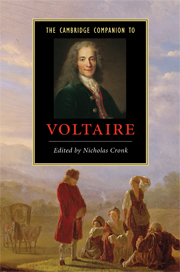Book contents
- Frontmatter
- Introduction
- 1 The making of a name: a life of Voltaire
- 2 Voltaire and authorship
- 3 Voltaire: philosopher or philosophe?
- 4 Voltaire and clandestine manuscripts
- 5 Voltaire and the myth of England
- 6 Voltaire’s masks: theatre and theatricality
- 7 Voltaire as story-teller
- 8 Candide
- 9 Voltaire and history
- 10 Voltaire’s correspondence
- 11 Voltaire: pamphlets and polemic
- 12 Voltaire and the politics of toleration
- 13 Voltaire and the Bible
- 14 The Voltaire effect
- Further reading
- Index
1 - The making of a name: a life of Voltaire
Published online by Cambridge University Press: 28 May 2009
- Frontmatter
- Introduction
- 1 The making of a name: a life of Voltaire
- 2 Voltaire and authorship
- 3 Voltaire: philosopher or philosophe?
- 4 Voltaire and clandestine manuscripts
- 5 Voltaire and the myth of England
- 6 Voltaire’s masks: theatre and theatricality
- 7 Voltaire as story-teller
- 8 Candide
- 9 Voltaire and history
- 10 Voltaire’s correspondence
- 11 Voltaire: pamphlets and polemic
- 12 Voltaire and the politics of toleration
- 13 Voltaire and the Bible
- 14 The Voltaire effect
- Further reading
- Index
Summary
Voltaire's eighteenth-century biographer Theophile Duvernet records an exchange from 1713 when the future philosophe, just 19 years old and completing his studies at the prestigious Jesuit Collège Louis-le-Grand in Paris, defies his father's insistence that he find a decent profession: 'I don't want any other than that of man of letters' ('je n'en veux pas d'autre que celui d'homme de lettres'). Two key points emerge from this remark.
Firstly, telling the story of the 'life of Voltaire' is, from the earliest years of that phenomenon, as much about describing the self-conscious construction and mythologisation of an intellectual identity as it is about enumerating the objective events that marked his career. One cannot offer so much as the date of his birth in 1694 without having to account for Voltaire's persistent manipulations of the fact in an effort to mould a particular image for himself. Baptismal records indicate 21 November; but the apparently concrete self-evidence of this detail is undercut by Voltaire's own assertions that he had actually been born nine months earlier on 20 February. Lest we let ourselves believe that a letter from later in his life suggesting that he always claimed the earlier date as a measure of self-protection - that is, by seeming older he was more likely to avoid persecution - offers solid insight into the 'true story' of the writer (D16346), it is worth recalling that Voltaire was, throughout his life, deeply invested in presenting himself as old, ailing and persecuted. His correspondence runs rife with references to his faltering health, imminent death and troubles at the hands of those hostile to his cause. In this respect, what had seemed to be a glimpse backstage into the real facts of the life of the philosophe turns out, typically, to be yet another scene in the staging of this life.
- Type
- Chapter
- Information
- The Cambridge Companion to Voltaire , pp. 17 - 30Publisher: Cambridge University PressPrint publication year: 2009
- 2
- Cited by

